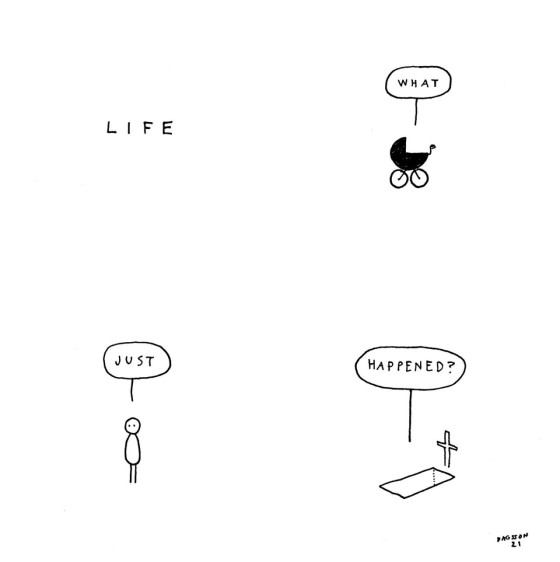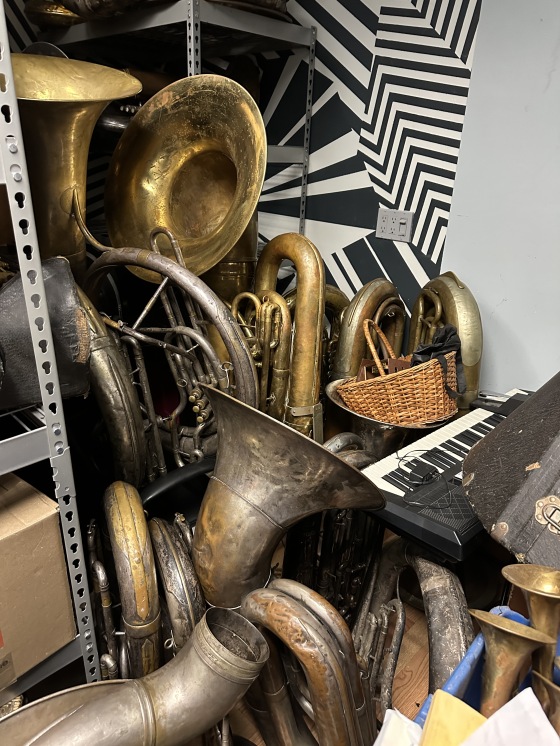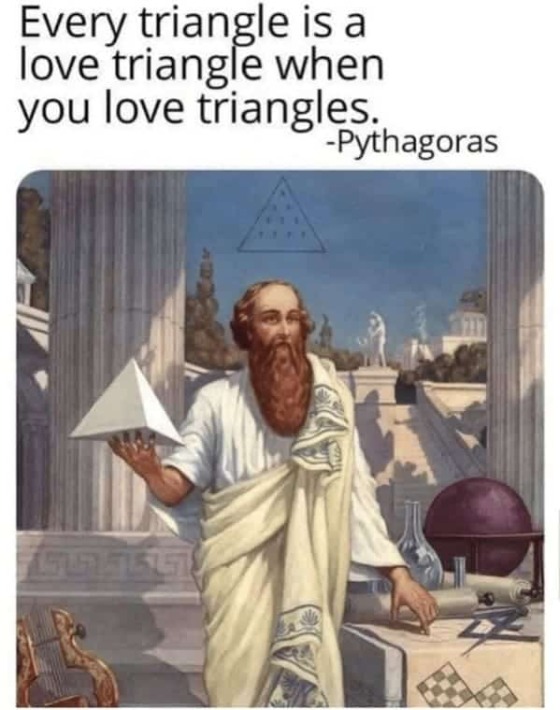
Kirk Israel's commonplace and blog. Quotes and links daily since 2001.
2024.05.05

2024.05.04
Some of his point is that it's our very finitude that gives meaning to what we are - and our inability to have the infinities we think we want that causes so much misery.
He's kind of a recovered "time management specialist", and another theme is we can never really catch up with our todo lists, because as our accomplishments grow, so do our expectations of what we can do. Become a diligent worker, you'll likely get more work - and the same goes for our expectations of ourselves.
Like me he gets a lot of mileage out of sharing quotes and thoughts from other writers, so here are some pieces that stood out for me:
It's the very last thing, isn't it, we feel grateful for: having *happened*. You know, you needn't have happened. You needn't have happened. But you did happen.
What makes it unbearable is your mistaken belief that it can be cured.
You teach best what you most need to learn.
It's a self-help cliché that most of us need to get better at learning to say no. But as the writer Elizabeth Gilbert points out, it's all too easy to assume that this merely entails finding the courage to decline various tedious things you never wanted to do in the first place. In fact, she explains, "it's much harder than that. You need to learn how to start saying no to things you do want to do, with the recognition that you have only one life."
The struggle for certainty is an intrinsically hopeless one--which means you have permission to stop engaging in it.
"Trying to control the future is like trying to take the master carpenter's place," cautions one of the founding texts of Taoism, the Tao Te Ching, in a warning echoed several centuries later by the Buddhist scholar Geshe Shawopa, who gruffly commanded his students, "Do not rule over imaginary kingdoms of endlessly proliferating possibilities." Jesus says much the same thing in the Sermon on the Mount (though many of his later followers would interpret the Christian idea of eternal life as a reason to fixate on the future, not to ignore it). "Take no thought for the morrow, for the morrow shall take thought for the things of itself," he advises. Then he adds the celebrated phrase "sufficient to the day is the evil thereof," a line I've only ever been able to hear in a tone of wry amusement directed at his listeners: Do you first-century working-class Galileans really lead such problem-free lives, he seems to be teasing them, that it makes sense to invent additional problems by fretting about what might happen tomorrow?
A plan is just a thought.
In his play The Coast of Utopia, Tom Stoppard puts an intensified version of this sentiment [that a good childhood isn't just a way of getting a good adulthood] into the mouth of the nineteenth-century Russian philosopher Alexander Herzen, as he struggles to come to terms with the death of his son, who has drowned in a shipwreck--and whose life, Herzen insists, was no less valuable for never coming to fruition in adult accomplishments. "Because children grow up, we think a child's purpose is to grow up," Herzen says. "But a child's purpose is to be a child. Nature doesn't disdain what only lives for a day. It pours the whole of itself into each moment ... Life's bounty is in its flow. Later is too late."
Time is the substance I am made of. Time is a river which sweeps me along, but I am the river; it is a tiger which destroys me, but I am the tiger; it is a fire which consumes me, but I am the fire.
Finally something he doesn't quote but fits some of his themes:
I'll tell you a secret. Something they don't teach you in your temple. The Gods envy us. They envy us because we're mortal, because any moment might be our last. Everything is more beautiful because we're doomed. You will never be lovelier than you are now. We will never be here again.Still, I wonder if it's more of an attempt at sour grapes. Maybe we shouldn't want to live forever, but often it feels like it would be nicer to have more say in the timing of it all...

2024.05.03
My default has been the joke-y "what do you do for fun or profit?" - I like the mood of it but too often it turns the conversational spotlight to the goofiness of the question itself.
Recently I heard "What keeps you busy?" which I kind of like... on paper it's not that different from "what do you do?" but somehow leans more towards the "for fun" part - like work is hopefully 9-5ish but the busyness might come from family or hobbies which might be cooler to talk about. On the other hand I'm not sure I like the possible suggestion that "busyness" is a goal.
I co-lead a reading + discussion group on Science and Spirituality - here's a snippet I'm encouraging group members to share on social media about our next meeting:
Come join Belmont's UU Science + Spirituality group on May 23rd (via Zoom) - we have a lively monthly reading and discussion on the world in general and the tensions and synergies of different spiritual and scientific outlooks.
In May will be discussing the book "Life Worth Living: A Guide to What Matters Most", with topics including Mary Wollstonecraft (early feminist), Confucianism, Buddhism, Stoicism and Utilitarianism as components to living a good life.
Please email kirkjerk@gmail.com to be placed on the groups announcement list to get the zoom link and a PDF of an excerpt of the reading.

2024.05.02
4 star:
* Lost With You (Patrick Watson)
Beautiful, stirring tender song. Ran into on the excellent Hulu miniseries adaption of the novel "Conversations with Friends"
* Life in the Old Dog (Magna Carta)
A friend posted a different version of this - very sweet and nostalgic
* Proud Mary (Ike & Tina Turner & The Ikettes)
Melissa on a deep Proud Mary live kick but I keep it simple.
3 star:
* Regulate (feat. Nate Dogg) (Warren G)
* Up From The Grave He Arose (Salem Corps Brass Band Collaborate)
every once in a while I get nostalgic for music I played in Salvation Army band... this one is especially melancholy as one of those 2020 "everyone puts down a track remotely" arrangements.
* BLACKBIIRD (Beyoncé, Tanner Adell, Brittney Spencer, Tiera Kennedy & Reyna Roberts)
* Rush E (Dragonwave Version) (Erhu4All)
* Polka Face ("Weird Al" Yankovic)
* Demons (Guster)
sQ's cross-generation song that isn't "Fat Bottom Girls"
* So-Claybe (Second Beat Songs)
"Call Me, Maybe" with every other beat removed...
* Notoriety II (Malcolm Kirby Jr.)
from a Saints Row video game soundtrack.
* Workin' On the Railroad (Raffi)



2024.05.01
Open Photo Gallery


I just want to say – you know – can we, can we all get along? Can we, can we get along? Can we stop making it horrible for the older people and the kids? And ... I mean we've got enough smog in Los Angeles let alone to deal with setting these fires and things ... It's just not right. It's not right, and it's not going to change anything. We'll get our justice. They've won the battle, but they haven't won the war. We'll get our day in court, and that's all we want. And, just, uh, I love – I'm neutral. I love every – I love people of color. I'm not like they're making me out to be. We've got to quit. We've got to quit; I mean, after all, I could understand the first – upset for the first two hours after the verdict, but to go on, to keep going on like this and to see the security guard shot on the ground – it's just not right. It's just not right, because those people will never go home to their families again. And uh, I mean, please, we can, we can get along here. We all can get along. We just gotta. We gotta. I mean, we're all stuck here for a while. Let's, you know, let's try to work it out. Let's try to beat it, you know. Let's try to work it out.
2024.04.30
Imagine what it would look like if ChatGPT were a lossless algorithm. If that were the case, it would always answer questions by providing a verbatim quote from a relevant Web page. We would probably regard the software as only a slight improvement over a conventional search engine, and be less impressed by it. The fact that ChatGPT rephrases material from the Web instead of quoting it word for word makes it seem like a student expressing ideas in her own words, rather than simply regurgitating what she's read; it creates the illusion that ChatGPT understands the material. In human students, rote memorization isn't an indicator of genuine learning, so ChatGPT's inability to produce exact quotes from Web pages is precisely what makes us think that it has learned something. When we're dealing with sequences of words, lossy compression looks smarter than lossless compression.Admittedly this was written last year but I think he underestimates the usefulness of ChatGPT in applying knowledge to a particular case at hand:
This analogy makes even more sense when we remember that a common technique used by lossy compression algorithms is interpolation--that is, estimating what's missing by looking at what's on either side of the gap. When an image program is displaying a photo and has to reconstruct a pixel that was lost during the compression process, it looks at the nearby pixels and calculates the average. This is what ChatGPT does when it's prompted to describe, say, losing a sock in the dryer using the style of the Declaration of Independence: it is taking two points in "lexical space" and generating the text that would occupy the location between them. ("When in the Course of human events, it becomes necessary for one to separate his garments from their mates, in order to maintain the cleanliness and order thereof. . . .") ChatGPT is so good at this form of interpolation that people find it entertaining: they've discovered a "blur" tool for paragraphs instead of photos, and are having a blast playing with it.I'm willing to grant that asking ChatGPT to apply its embedded gleaned knowledge to a particular problem is basically that kind of of interpolation, but in practice it is far more useful than making entertaining mashups. In my case, especially for technical tasks - to quote David Winer
ChatGPT is like having a programming partner you can try ideas out on, or ask for alternative approaches, and they're always there, and not too busy to help out. They know everything you don't know and need to know, and rarely hallucinate (you have to check the work, same as with a human btw). It's remarkable how much it is like having an ideal human programming partner. It's the kind of helper I aspire to be.
Jessica Valenti goes hard into the damage Republicans know their actions against a woman's right to choose will be and it's fundamental unspoken premise - "enforcing a worldview that says it's women's job to be pregnant, and to stay pregnant to matter what the cost or consequence."

(I'm not saying there aren't some counterpoints but in it seems like a good rule of thumb)
I really have trouble squaring "Google is poor" (has to conduct layoffs, offshore and outsource jobs, remove staplers) with record revenue and profits, CEO pay so high, stock buybacks and now even dividends. I can't connect the dots -- not charitably.
People are worried about AI becoming a paperclip maximizer. But the thing is, wall street already is a paperclip maximizer.
2024.04.29

I was considering transcribing it but The Internet Archive has it. (For now... I hope they get past these stupid lawsuits.)


